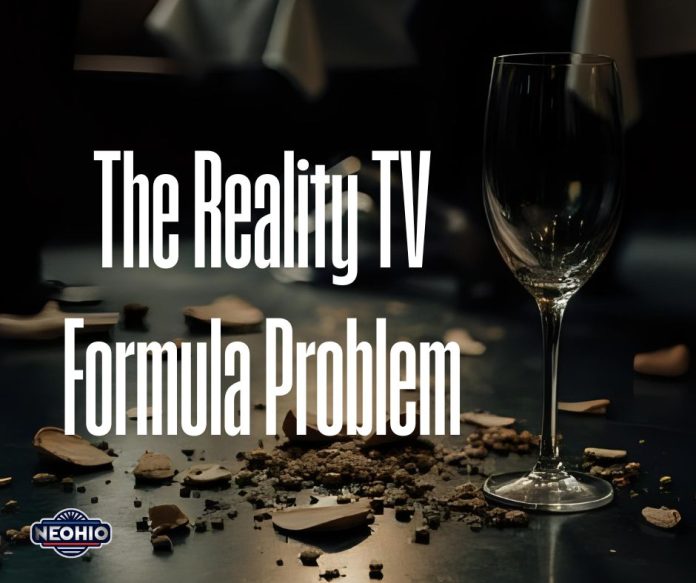The golden age of reality television may be losing its luster, and it’s not hard to see why. After decades of watching the same tired playbook, viewers are becoming increasingly sophisticated about spotting manufactured drama – and they’re tuning out in droves.
The Stale Template That’s Killing Shows
Walk into any Real Housewives production meeting, and you’ll likely hear the same formula being recycled: throw a lavish party, invite cast members who despise each other, dress everyone in over-the-top costumes, make sure there’s plenty of alcohol flowing, and watch the fireworks. When that doesn’t work, producers dig up old grievances that have been apologized for countless times and force cast members to rehash them on camera.
The alcohol factor is particularly calculated – producers know that lowered inhibitions lead to bigger conflicts, louder arguments, and more dramatic confrontations. It’s become such a standard part of the formula that viewers can practically predict when someone will have one drink too many and start airing dirty laundry or throwing accusations around the room.
It’s a template that’s become as predictable as a soap opera script. Cast members know exactly what gets them screen time – stirring the pot, creating confrontation, and manufacturing drama out of thin air. The result? Shows that feel less like authentic glimpses into real lives and more like poorly acted theater with a full bar.
Why the Formula is Failing
Audiences are becoming more intelligent and selective about the shows they choose to spend time watching. They’re moving away from repetitive and over-produced content that feels fake. Modern viewers can spot producer manipulation from a mile away, and they’re no longer willing to invest emotionally in obviously contrived storylines.
The numbers tell the story. Reality TV viewership among the top 50 broadcast shows has plummeted from about 33% in 2009-10 to just 12% in 2022-23. While some individual shows maintain strong performance, the overall trend is clear: audiences want authenticity, not artificial drama.
The Producer’s Impossible Task
Here lies the central dilemma facing reality TV producers: without manufactured conflict, many of these shows would simply be wealthy people having lunch and discussing their vacation plans. Producers must create drama to keep viewers engaged, but the more obvious their manipulation becomes, the more viewers abandon ship.
The Real Housewives franchise exemplifies this trap. Cast members study previous seasons to learn what generates buzz. They know that friendship and reconciliation arcs get them invited back, while stirring controversy keeps their names trending on social media. New additions quickly learn the unspoken rules: create alliances, manufacture feuds, and never let a conflict truly resolve.
What’s Working Instead
The reality shows finding success in 2025 have abandoned the old playbook entirely. Shows like The Traitors combine strategic gameplay with authentic competition, creating cross-fanbase appeal that feels fresh rather than recycled. Beast Games succeeded by offering genuine high stakes – the largest cash prize in reality TV history – where outcomes actually matter.
Love Island USA exemplifies this evolution perfectly. The show has become a streaming powerhouse precisely because it offers authentic romantic drama rather than manufactured conflicts. Season 6 broke viewership records as the #1 reality series across all U.S. streaming platforms, with 434 million minutes viewed. Season 7 continued this momentum, reaching over 1.2 billion minutes viewed across just nine episodes and attracting 50 million viewers in 25 days.
What makes Love Island work is its organic drama. Contestants arrive as unknowns with genuine romantic intentions, creating real emotional stakes. When someone gets “pied off” or a new islander shakes up existing couples, the reactions are authentic because the relationships – however brief – involve real feelings. The villa setting creates natural pressure points without requiring producer manipulation.
But the most compelling template emerging is shows featuring completely unknown participants in authentic high-stakes situations. McBee Dynasty exemplifies this approach perfectly – a kind of spiritual successor to Joe Millionaire that proves fresh faces create better television than recycled reality stars.
The show succeeds because viewers have no preconceived notions about its cast members. Unlike reality veterans who arrive with established personas and social media strategies, the McBee family members are discovering their storylines in real time. When the women learn about the polygamous situation, their shock is genuine – not the performed amazement of veteran cast members who’ve learned to manufacture surprise for cameras.
McBee Dynasty combines all the elements that make modern reality TV work:
- Unknown participants without calculated reality TV personas
- Real stakes involving actual family business succession worth millions
- Authentic setting where farm work creates natural challenges and conflicts
- Genuine consequences affecting actual livelihoods and legacy
- Multiple organic storylines from romance to family dynamics to potential FBI allegations
The show is only in its second season, meaning viewers haven’t grown tired of predictable character arcs or figured out each cast member’s “television personality.” Every reaction feels fresh because participants are still discovering who they are on camera.
These successful shows share common elements:
- Real consequences beyond just staying relevant for next season
- Genuine competition rather than forced personal conflicts
- Fresh concepts that haven’t been recycled for 15+ seasons
- Authentic moments that feel unscripted
- Unknown participants who can’t rely on established fan bases
- Organic romantic drama that develops naturally rather than through producer orchestration
The Evolution Viewers Demand
Industry professionals recognize the need for change. Producers are calling for “embracing bold, untested ideas and reigniting the magic that sparked this industry” rather than relying on tired formulas that once worked but now feel stale.
The shift represents a broader maturation of both the medium and its audience. Viewers who grew up watching reality TV now want shows that respect their intelligence. They’re seeking authentic competition, genuine emotions, and real stakes – not the manufactured drama of cast members playing exaggerated versions of themselves.
The Path Forward
The solution isn’t to eliminate drama – it’s to find it in authentic places. Real competition creates natural tension. Actual consequences generate genuine emotion. Fresh faces provide unpredictable storylines that feel organic rather than producer-driven.
Shows like McBee Dynasty and Love Island USA prove that audiences don’t need familiar faces cycling through different programs or contrived party scenarios – they need real people facing actual consequences in genuine situations. This template offers endless possibilities: real families running businesses, unknown entrepreneurs competing for investment, ordinary people navigating extraordinary circumstances, or singles genuinely looking for love.
For the industry to thrive, it must abandon the assumption that audiences want the same recycled conflicts served up in different costumes at different parties. Modern viewers are smarter than that, and they deserve better than reality TV’s tired old tricks.
The shows that understand this evolution are thriving. Those clinging to outdated formulas are learning a harsh lesson: in an age of endless entertainment options, authenticity isn’t just preferred – it’s required.











